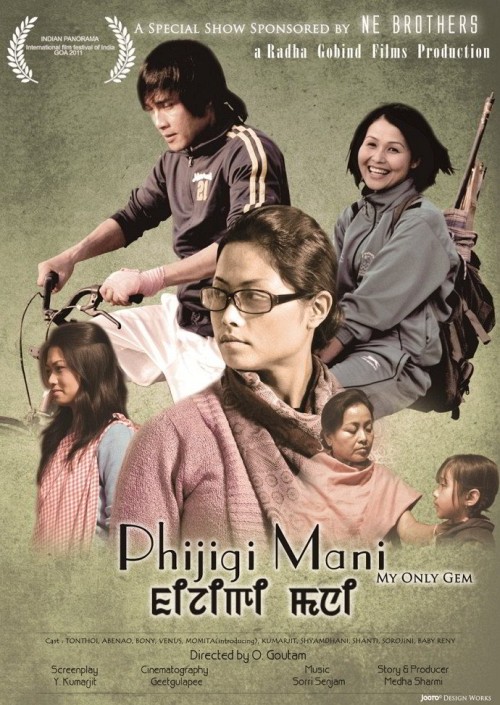Phijeegi Mani : Why did it win the National Awards ?
Review by Kumam Davidson *

Phijigee Mani
The last Manipuri feature film to have won the prestigious National Awards was Makhonmani Mongsaba's Chatledo Eidi in 2000. The film did made a significant appeal, but it was a celluloid film and this a digital, so a history of Manipuri cinema is also co-incidentally captured in this award winning incidents with a gap of 11 years.
Notwithstanding, Manipur has also seen remarkable digital films since its inception years back. Mami Sami is one such remarkable film that has captured Manipur, Moirang and the socio-political tensions that grip the land on-screen that few films could manage to do. Ningthouja Lancha has also had his own share of accolades more in terms of audience appreciation and a niche the film has carved for itself.
People still remembers it as one of the best Manipuri films ever made. For matter of convenience, documentaries are not touched upon here because the curiosity is to see how a digital feature film manages to achieve the much coveted National Awards; Best Regional film in the Manipuri language and Best Supporting Actor (female) in the 59th National Film Awards for 2011.
The film is constructed on some crucial and sensitive sentiments that occupy the common mindset. The strength and flip-sides of sports in the state remain an undeniable discussion. The new generation even if not so new that travels and settles beyond the state and thereby giving a range of cultural and linguistic hybridity that often shocks parents is the crux of the film. Even if the film doesn't dwell on sports throughout, it manages to showcase the space sports occupy in this largely terrified land.
Sports have been giving recognition, fame and a sort of identity while the pursuit of an identity is all messed up. Witty enough and without much exaggerations, the film definitely looks at the prevalence of negligence and inefficiency of sports departments and individuals associated with. It's very ironic and tragic that when the state creates a voice through sports, when a lot of youth are making monumental efforts towards personal achievements and state/national glory, rampant corruption lurks within.
This is nothing new only that a serious film finally starts talking about it. It can be co-incidental that the National Awards recognises a film with a serious commentary on sports while there is a simmering tendency that is in perpetuation to define Manipur in the language of sports (besides the presence of a strong and tense political and social atmosphere) for quite a long time. Sports or conflict, both deserve a positive and unprejudiced approach.
The National Media (New Delhi as it has become the metonym of India's power and governance) for a long time, for instance didn't talk about Mary Kom where half the rest of the world murmurs about her. This has to be mentioned because I have heard and have thought about the discourses around Saina Nehwal and Mary Kom in the national representation to pick up an example.
This is one crucial indicator of a kind of indifference and suspicious attitude that has always been a roadblock in better representation of certain sections of India (Manipur). Recent attention has been a little audible and visible. I am concerned about the ways and contents of representation in the national media because that is one of the spaces where identities get exposed or explored to be understood and accepted or even denied.
Digressions apart, one should also realise that sports is not just about fame, spectacle and entertainment; it is undeniably a source of livelihood and a way of living for thousands of people already at least in the context of the state. Uncritical glossing over of this might give limited panorama of the culture. Sports is not just a pursuit anymore, it has become part of the everyday sentiments. How much such pursuit can change individual and family is at the core of the film. The film is very matured in that sense.
The way it treats the subject matter shows a very matured understanding, the way it defines and plays the family life and its society on-screen clearly assures an extremely delicate and rigorous work done off-screen. The film is definitely worthy of appreciation for its maturity and doing an off-beat kind of film (unnecessary glossed melodrama might be stale to consume for serious audience).
Not just the award for the best film category (which I have already explored above in certain angles) I am equally enthusiastic and excited about the award for the best supporting actor (female). This category is of rare recognition in the history of Manipuri Cinema. I indeed looked at Yaiphabi (Tonthoi) in the film carefully.
By the end of last scene, I thanked the National film fraternity for bestowing the right recognition to the right actor and work. Nevertheless, any conscious viewer will love to see all the films of the nominees in this category. That might also render a lucid approach towards accessing Tonthoi's performance. Still, it is such a well oriented role.
The dialogues are spontaneous and well worked out. Of course, a feminist take on the film will have strong attack at the unjustified structure in terms of gender classification and roles. This I am leaving out for the moment. More than the role she plays; the way the role has been played out on-screen for me is much more significant.
It seems the role is moulded perfectly, the dialogues are scripted so well and Tonthoi happens to deliver with conviction and aura that she receives the attention of the National Awards. This is a huge achievement and audience by now have great expectations from her. She also has Thoicha to her credit. She certainly carves out a niche for herself and a certain way of doing films in a digital industry. She redefines acting as she has crossed the formula of elaborate costumes, stunning hairstyles and makeup.
She does it; just that she doesn't overdo forsaking performance and art. Once again, a performance of such credibility did deserve an honourable award. And there she gets it.
Congratulations to Tonthoi, Gautam and everyone who has been part of the film. Good luck to future endeavours until one is pinged by a feminist critique or any other
